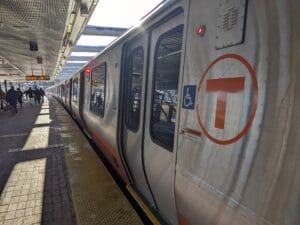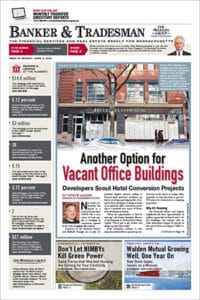A prominent transit advocate is questioning the MBTA’s plans to shut down one of its busiest subway lines for a month starting in a little over two weeks to carry out a backlog of repairs amid an ongoing investigation by federal officials into the agency’s safety and maintenance practices.
The Boston Globe first reported the plans to close the Orange Line for an extended period Tuesday evening. When contacted by Banker & Tradesman, MBTA spokesperson Joe Pesaturo referred a reporter to a press conference Gov. Charlie Baker, Transportation Secretary Jamey Tesler and MBTA General Manager Steve Poftak plan to hold at the Orange Line’s Wellington station and train yard 12:30 today “to deliver an update regarding accelerated infrastructure upgrades to the MBTA to improve service, safety and reliability for riders.”
The MBTA board of directors voted this morning to approve a contract with Yankee Bus Lines for buses to carry riders during the shutdown between Aug. 19 through Sept. 18.
“One of the key findings in the FTA directives is that our maintenance teams don’t have adequate access and this will be giving them around-the-clock access to get what I think we all agree is critical track maintenance done,” Poftak told the board, adding that a suite of other “reliability” upgrades will be part of the work performed during the shutdown.
The closure comes after the T suddenly delayed a planned month-long shutdown of the tracks north of the Wellington Station last week, originally intended to replace a mile and a half of track and upgrade the signal systems on that section of line. And last week, Boston Mayor Michelle Wu told WBUR’s “Radio Boston” program last week that she believed the T should engage in large-scale shutdowns to address its maintenance backlog, instead of .
“Getting it done would then free up resources at the T to focus on improving other parts of it,” the mayor, a prominent voice on transit issues, said.”We could give over street space for shuttle buses as alternatives to go as quickly as possible, and we will do everything we can to work hand-in-hand with the T.”
Federal Transit Administration investigators had zeroed in on the poor state of the Orange Line’s tracks in and around the line’s Back Bay Station in one of their emergency orders issued earlier this summer. Slow zones – a potential sign of tracks in such poor repair that trains must travel over them slowly – had proliferated in the area for months according to advocacy group TransitMatters. However, the section called out in the FTA report was repaired in July, the T announced last month, lifting the speed restrictions from 10 to 25 miles per hour. Further fixes, the T said, would raise the track speed to the normal 40 miles per hour.
Rick Dimino, CEO of business-backed advocacy group A Better City, said the completion of these emergency repairs call into question the need for the shutdown. He called the plan “a surprise attack” on riders and said it was “no way to run a train line.”
The shutdown, if it was to occur at all, should have been planned with robust public input, he said, and announced with a clear plan to minimize the pain for riders and businesses that rely on the T. He criticized the decision by Baker and MBTA officials to extend the shutdown into September, long past the time when students return to Boston’s public schools and universities, and when many workers return from summer vacations.
“In theory the mayor has been engaged in the campaign to argue people should return to the office and return to Boston? This is cold water in the face of that idea,” he said.
Instead, he argued, a long, painful and disruptive shutdown on a subway line that carries 101,000 riders every day, including many transit-dependent riders, and the city’s safety-net hospital, Boston Medical Center, was likely to take a serious toll on public confidence in the system, leading to worse traffic and hurting businesses whose workers won’t be able to get to their jobs on time.
Jim Rooney, president and CEO of the Greater Boston Chamber of Commerce, called the short notice given for the shutdown “unfortunate and unfair” at a time when “the T is underperforming in both service reliability and customer confidence in system safety.”
“The T must be committed to delivering a well-constructed, strategic service plan and clearly defining the work to be accomplished and the benefits to commuters of accepting this inconvenience,” he said in a statement. “The T still needs to have a reckoning to hold themselves accountable and answer the questions of how we got here and how we avoid future service interruptions, planned and unplanned.”
Catherine Gleason, program and policy coordinator at transit advocacy group LivableStreets Alliance, said riders would be “paying the price” for the “long-overdue” nature of the repairs being performed during the shutdown. Like Rooney and Dimino, she said the T needed to put forward a strong plan to make sure the shutdown generates the least pain possible.
“We want to know how the MBTA will be supporting riders throughout the shutdown, how they’ll be ensuring excellent shuttle service that isn’t held up in traffic, whether other parts of the system will have more frequent service, and how riders will be given the flexibility they need to get around, including things like free and reduced cost service, or being able to pay subway fares to ride the commuter rail,” she said. “The MBTA will need to clearly communicate to riders how to navigate the system and be transparent about when service closures will end. T riders deserve to be in the know about how they can sustain their daily lives.”







